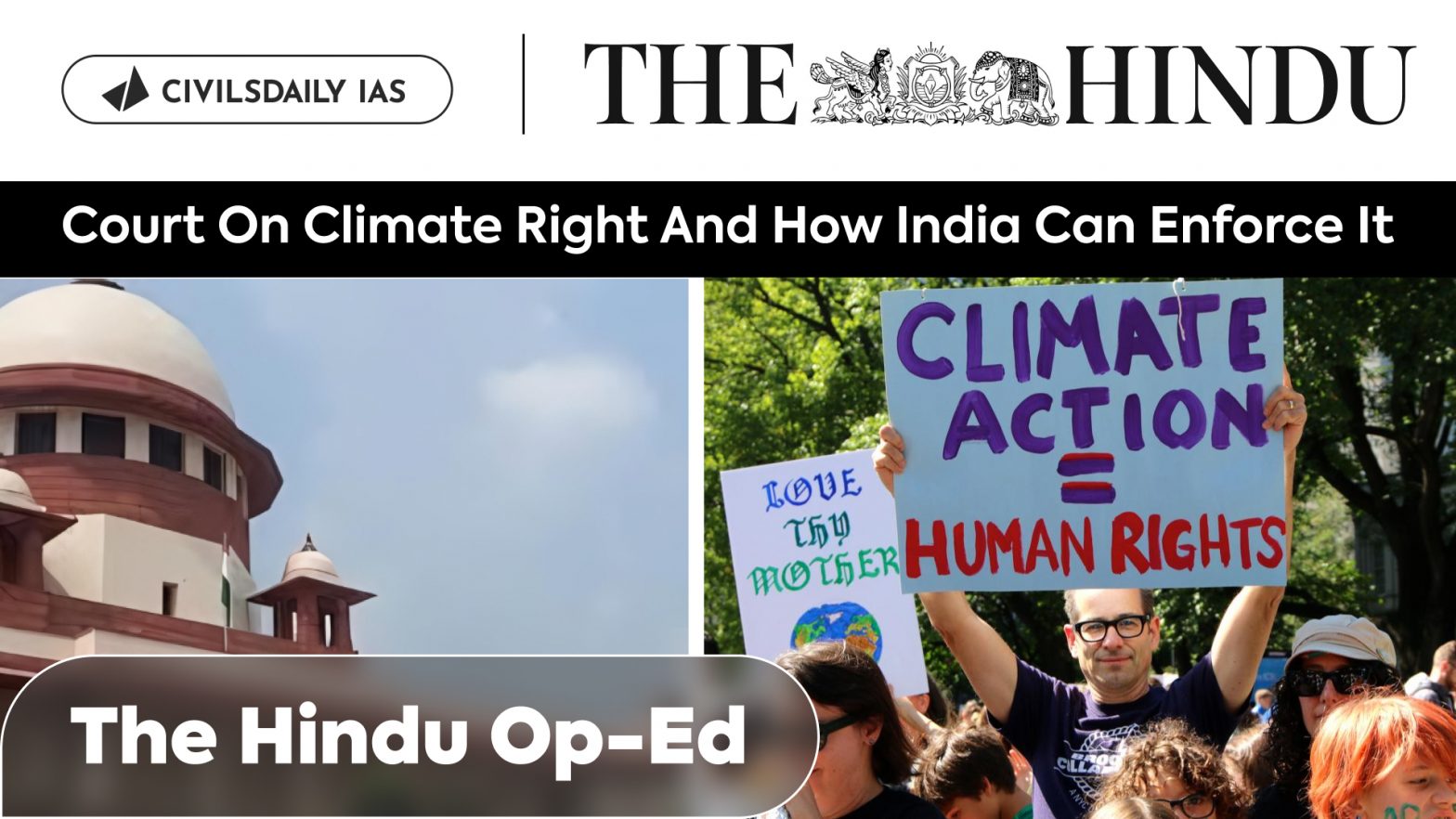| Mains PYQ Relevance: Q) “The most significant achievement of modern law in India is the constitutionalization of environmental problems by the Supreme Court.” Discuss this statement with the help of relevant case laws. (UPSC IAS/2022) Q) Examine the scope of Fundamental Rights in the light of the latest judgement of the Supreme Court on Right to Privacy. (UPSC IAS/2017) Prelims: Q) The power of the Supreme Court of India to decide disputes between the Centre and the States falls under its (UPSC IAS/2014) (a) Advisory jurisdiction (b) Appellate jurisdiction (c) Original jurisdiction (d) Writ jurisdiction |
Note4Students:
Prelims: Supreme Court on Endangered species;
Mains: Landmark Judgements by SC; Judicial Interventions;
Mentor comments: The Supreme Court in M K Ranjitsinh & Ors. v. Union of India & Ors. ruled that people have a right to be free from the adverse effects of climate change which should be recognised by Article 14 and Article 21 of the Constitution. The ruling of the Supreme Court was rendered in response to a writ brought by a government official. The court acknowledged the complex interplay between environmental conservation, social equity, economic prosperity, and climate change. It stressed the need to balance the conservation of endangered species like the Great Indian Bustard (GIB) with the imperative of protecting against climate change.
It appointed an Expert Committee to determine the best way to protect the species. This decision aimed to support India’s renewable energy goals and climate commitments while ensuring environmental protection. However, the effectiveness of court rulings on climate change remains a question, as climate change is a complex, multi-dimensional problem that requires a holistic approach. The court’s decision to defer to the executive on certain matters related to climate change policy has also been criticized by some experts.
Let’s learn
—
Why in the News?
The Apex court’s recent decision on M K Ranjitsinh & Ors. v. Union of India & Ors. to defer to the executive on certain matters related to climate change policy has been questioned by experts.
| What was the Supreme Court’s recent Landmark Judgment? • The Supreme Court in M K Ranjitsinh & Ors. v. Union of India & Ors. ruled that that people have a right to be free from the adverse effects of climate change which should be recognised by Article 14 and Article 21 of the Constitution. • The ruling of the Supreme Court was rendered in response to a writ brought by conservationist and retired government official M K Rnajitsinh, who sought protection for two endangered species namely the Lessor Florican and the Great Indian Bustard. • The court acknowledged the complex interplay between environmental conservation, social equity, economic prosperity, and climate change. • While modifying its earlier order to underground power cables in the Great Indian Bustard’s habitat, the court prioritized transmission infrastructure to enable renewable energy development to address climate change. |
Present challenges along the verdict of Supreme Court:
- Unresolved questions: The judgment leaves unresolved questions regarding the court’s emphasis on large-scale clean energy as the main pathway to avoiding climate harm and its potential understatement of climate adaptation and local environmental resilience.
- Non-clarity: The court did not clarify how the newly recognized right against the adverse effects of climate change will be protected in practice.
- Two potential approaches to realizing this right emerge:
- The proliferation of court-based climate litigation, which may lead to an incomplete patchwork of protections.
- The enactment of climate legislation, which can provide an overarching framework to guide future policy.
The Need for Climate Legislation in India
- Absence of an “umbrella legislation” in India : India needs climate legislation that is tailored to its unique context, rather than blindly copying other countries.
- Framework climate legislation can set the vision for engaging with climate change across sectors and regions, create necessary institutions, and put in place processes for structured and deliberative governance in anticipation of and reaction to climate change.
- Tailoring Climate Legislation to the Indian Context should also:
- create a supportive regulatory environment for sustainable cities, buildings, and transport
- enable adaptation measures like heat action plans and climate-resilient agriculture
- protect key ecosystems like mangroves
- consider social equity in achieving these goals
- A single, omnibus law covering all these areas may not be feasible given India’s existing legal framework.
| Lessons from International Experience: • Climate laws in many countries, like the UK’s, focus narrowly on regulating carbon emissions, which is ill-suited for India. • Instead, India needs an “enabling law” that stimulates development-focused decisions across sectors towards low-carbon and climate-resilient growth. • An enabling law should be more procedurally-oriented, creating institutions, processes, and standards for mainstreaming climate change across ministries and society (emphasizing both adaptation and mitigation). |
Federal Factor:
- On Decentralized approach: Many areas relevant to climate action, such as urban policy, agriculture, water, and electricity, fall under the authority of state and local level governments. An Indian climate law must set a framework for coherent national action and decentralize sufficiently to empower states and local governments.
- On Fiscal and Governing Policies: The regional states and local governments need to be provided with information and finance to take effective actions. This would enable diverse segments of society to bring their knowledge and expertise to the table in addressing climate change.
The Way Forward:
- India should learn from international experience, both in terms of what not to do and what directions to follow.
- The country’s climate legislation should be tailored to its unique context of being a developing, highly vulnerable nation still building its infrastructure.


